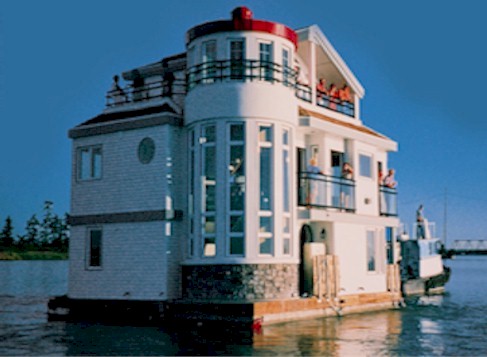|
BY SUSANNA CONTINI HENNINK
DELFT - Living in one of the most densely populated countries in the world, the Dutch are always trying to come up with new ways to make the most of their limited space.
With a plentiful supply of lakes and marshland, they have been draining land and building islands to live on for centuries.
But in recent years, the focus has shifted. Increased rainfall, melting glaciers and rising sea level are carrying more water through Europe's rivers and flooding Holland's deltas.
The Dutch have realized that building higher dikes to keep out the sea is no longer a solution to the water problem.
|

You don't need extra land when your house is floating... |
|
Spatial planners are now looking for ways to accommodate more water, rather than continue fighting to keep it out. One solution is setting aside land which can be flooded by excess river water - so-called calamity polders.
Architects and city planners are also looking for creative solutions, offering residential and leisure facilities on or near water.
For example, the new Amsterdam suburb of IJburg on the IJ lake will include 250 stationary floating homes, as well as space for converted barges and house bats.
The city of Groningen is creating a neighborhood where water, homes, industry and leisure facilities will intermingle.
And a sting of luxury villas is being built near the river Maas on a site which is not protected by dikes. Thanks to their special construction the vials will be able to float if the land under them becomes flooded.
|
A panel of project developers last week discussed some of the benefits and problems of building on water with civil engineering student from Delft Technical University.
To build floating homes means finding answer to infrastructure problems such as accessibility to public services and the supply of utilities and drainage, the experts said.
'Living on water will probably be attractive to a limited number of people,' said Jan Winsemius of town planning research group Middelkoop. 'But that is not a problem. The construction sector should abandon the notion that all housing projects must target everyone,' he said.
Some advantages of water homes are that much of the construction can take place at a distance from the building site. And you can build in wet areas where housing currently is not possible,' said Winsemius
|
Nevertheless, 'living on water is not likely to provide a solution to our housing shortages,' said Arie van Wijngaarden, project director for floating homes in IJburg.
Van Wijngaarden pointed to the extra space floating homes require and the fact that water cannot support high-rise flats.
However, Frits Schoute, former professor of multi-media communication at Delft University, predicted that rising sea levels, decreasing supplies of fossil fuels and a lack of sufficient drinking water will force people to seriously consider the option of living on the seas.
Schoute took early retirement to devote himself full time to his plan to build a floating platform on the sea to be powered by wind, sun and wave energy.
His project is intended to be a model for cities floating on the seas, which he claims will be man's next frontier.
|
